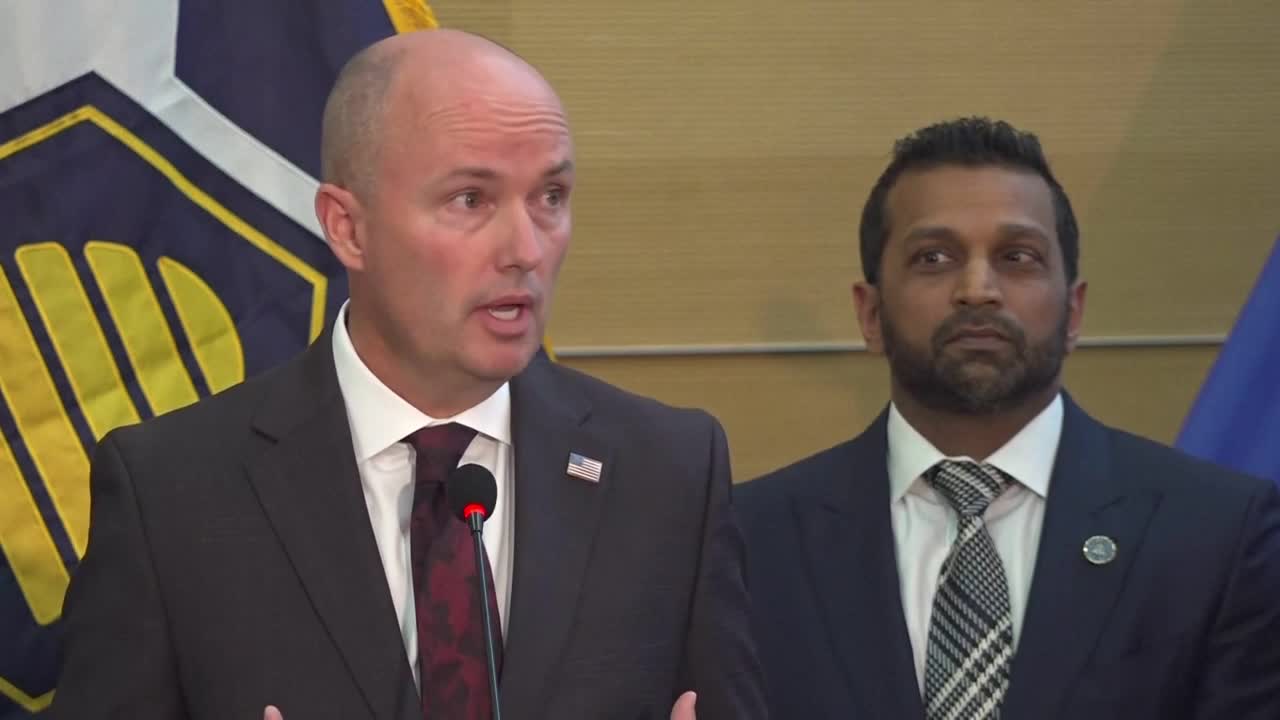WASHINGTON (AP) — In a week when Americans witnessed a public political assassination, oceans of angry words and a collective sense of horror and exhaustion, one man stepped up to a microphone and said something that stood out: It doesn’t have to be like this.
That man, Utah Gov. Spencer Cox, appeared weary, emotional, at times angry and on the verge of tears Friday. While he had the country's attention, he used the moment to ask his fellow Americans to turn down the temperature.
Cox, long an advocate for civility, said he didn't “want to get too preachy.” But he described the moment as one where the country's very ideals were on the line. He made an impassioned plea for Americans and young people in particular to use the horror of conservative activist Charlie Kirk’s assassination as an inflection point to turn the country away from political violence and division.
“This is our moment: Do we escalate or do we find an off-ramp?” Cox told a news conference in Utah as he announced authorities had a suspect in Kirk's killing in custody. “It's a choice.”
Watch the governor's remarks below:
Throughout his political career, Cox, a two-term Republican governor, has issued pleas for bipartisan cooperation and at times drawn national attention for his empathetic remarks.
His speech on Friday was his most emotional and prominent example yet, as he urged an appeal to common ground and humanity to forge a better society. It was a marked departure from the bellicose rhetoric often employed in recent years by U.S. politicians, especially President Donald Trump, who is known for provocative language and has blamed Kirk's killing on “radical left” rhetoric.
‘Politics feels like rage’
On Wednesday, after Kirk's killing, Cox made an initial plea. On Friday, acknowledging he was running on only 90 minutes of sleep after days of the manhunt for Kirk's killer and heated rhetoric unfurling online, he went further.
His voice appearing to break at times, Cox said that the response to violence and hate can be more violence and hate. “And that's the problem with political violence,” he said. “It metastasizes because we can always point the finger at the other side. And at some point, we have to find an off-ramp, or it's going to get much, much worse.”
“History will dictate if this is a turning point for our country,” he said. “But every single one of us gets to choose right now if this is a turning point for us.”
The 50-year-old governor, who has four children who are teenagers and young adults, directed some of his remarks to young people: “You are inheriting a country where politics feels like rage. It feels like rage is the only option.”
But, Cox said, a different path is possible: “Your generation has an opportunity to build a culture that is very different than what we are suffering through right now.”
He said the 22-year-old suspect in Kirk's killing had become “more political” in the run-up to Wednesday's shooting on a university campus.
Cox also spoke of the harms of social media and said it was terrible that Kirk's slaying was “so gruesomely displayed” for everyone to watch online.
“We are not wired as human beings biologically, historically we have not evolved in a way that we are capable of processing those types of violent imagery,” Cox said. “This is not good for us. It is not good to consume. Social media is a cancer on our society right now.”
These approaches are not new for Cox
As governor, Cox has sought to curb the harms of social media on young people, signing laws that require social media companies to verify the ages of their users and disable certain features on accounts of minors.
Though he lives in heavily Republican Utah, where little bipartisan action is needed for his party to enact its agenda, Cox has for years emphasized respect and unity. As governor, he has consistently invoked a need for civility — a trait that’s at home in the culture of the Church of Jesus Christ of Latter-day Saints, a faith to which Cox and many in the state belong.
His more moderate tone became rarer as Utah’s politics drifted rightward in the Trump era. At a statewide convention of Utah Republicans in April 2024, Cox was booed. “Maybe you hate that I don’t hate enough,” Cox told the crowd. He still won his state's GOP primary and reelection in November.
In 2016, Cox drew national attention for his remarks after a mass shooting at a gay nightclub in Orlando, Florida. Then, he called for people to come together and appealed to their “better angels.” He also apologized for having been unkind while in high school to students he later learned were gay.
He also drew attention during his 2020 campaign for governor, in which he appeared in television ads with his Democratic opponent as they pledged to “disagree without hating each other.”
Cox was openly critical of Trump and did not support him until after the president survived an assassination attempt in Butler, Pennsylvania, last year. The governor wrote then-candidate Trump a letter expressing admiration for his defiant response to being struck by a bullet.
In that letter, Cox told Trump he believed “God had a hand in saving you” and that “miracle” gave him an opportunity to unify the country.
“We need to turn down the temperature and find ways to come together again before it's too late,” Cox wrote.
Minutes before Cox took the stage Friday, Trump had that opportunity as he sat for a live interview on Fox News Channel. He was asked how the country could be brought back together. Trump said his response would “get me in trouble, but I couldn't care less.”
Before he launched into a list of grievances with his Democratic opponents, the president said: “The radicals on the left are the problem.”
___
Associated Press writer Chris Megerian contributed to this report.





